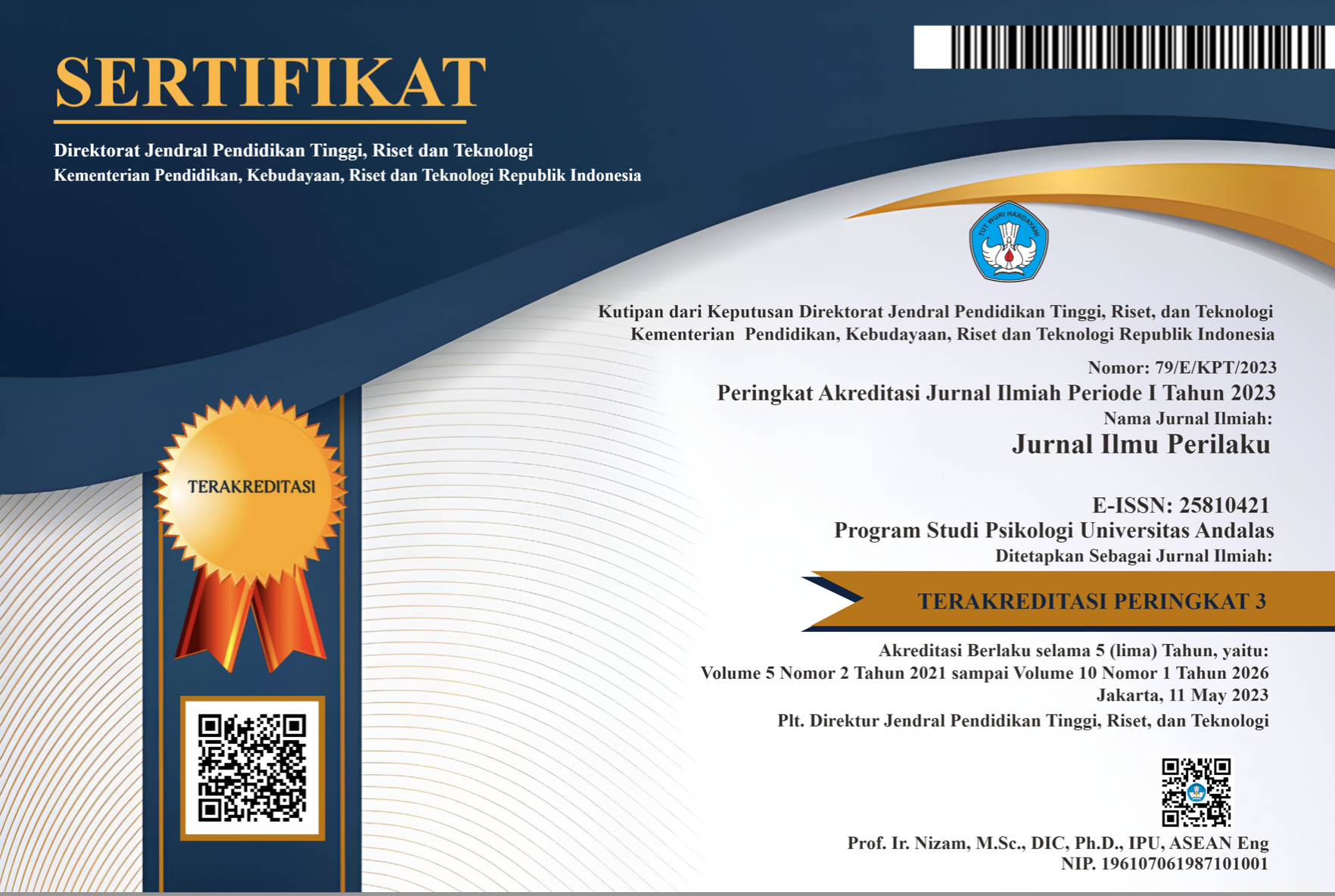Studi Kasus: Penggunaan Integrasi Cognitive Behavior Therapy (CBT) dan Expressive Writing pada Individu dengan Persistent Complex Bereavement Disorder (PCBD)
Abstract
Cognitive-behavior therapy (CBT) is known as strong evidence-based therapy used in handling various psychological complaints experienced by individuals. In addition, expressive writing is also known as an effective approach given to individuals who experience painful events and cause severe distress. One significant life event that can cause distress is the death of the closest person, known as grieving. Grieving becomes a nuisance when it causes an intense and prolonged sadness and manifested in daily functioning problems of the individual. This is known as persistent complex bereavement disorder (PCBD). This single case study study aimed to explain the use of CBT integrated with expressive writing in dealing with PCBD during five meeting sessions. Through intervention CBT and expressive writing, R, who was initially confused why she always feels sad for no reason, had no interest in activity, and felt lost her direction toward life, began to be able to identify and regulate her emotions, could return to engage to her daily activities, and foster interest in finding work again. In addition, R began to have an insight that she needed to regulate grieving which she had been avoiding.
Keywords: CBT, Expressive Writing, Persistent Complex Bereavement Disorder
Downloads
References
Bhugra, D., Wojcik, W., & Gupta, S. (2011). Cultural bereavement, culture shock and culture conflict: adjustments and reactions. Migration Ment Health, 139-49. DOI: 10.1017/CBO9780511760990.013
Boelen, P. A., & Smid, G. E. (2017). Disturbed grief: Prolonged grief disorder and persistent complex bereavement disorder. BMJ, 357, j2016. DOI: 10.1136/bmj.j2016.
Boelen, P. A., Van Den Hout, M. A., & Van Den Bout, J. (2006). A cognitive‐behavioral conceptualization of complicated grief. Clinical Psychology: Science and Practice, 13(2), 109-128. https://doi.org/10.1111/j.1468-2850.2006.00013.x
Bonanno, G. A., & Kaltman, S. (2001). The varieties of grief experience. Clinical psychology review, 21(5), 705-734. https://doi.org/10.1016/S0272-7358(00)00062-3
Bonanno, G. A., Wortman, C. B., Lehman, D. R., Tweed, R. G., Haring, M., Sonnega, J., ... & Nesse, R. M. (2002). Resilience to loss and chronic grief: a prospective study from preloss to 18-months postloss. Journal of personality and social psychology, 83(5), 1150. DOI: 10.1037//0022-3514.83.5.1150
Cooper, P. (2013). Writing for depression in health care. British Journal of Occupational Therapy, 76(4), 186-193. https://doi.org/10.4276/030802213X13651610908452
D'Amore, S. (2015). When Families Function as Grieving Systems: Clinical Implications. Human Systems Management, 26(3), 9-29.
Koopman, C., Ismailji, T., Holmes, D., Classen, C. C., Palesh, O., & Wales, T. (2005). The effects of expressive writing on pain, depression and posttraumatic stress disorder symptoms in survivors of intimate partner violence. Journal of health psychology, 10(2), 211-221. https://doi.org/10.1177/1359105305049769
Krpan, K. M., Kross, E., Berman, M. G., Deldin, P. J., Askren, M. K., & Jonides, J. (2013). An everyday activity as a treatment for depression: the benefits of expressive writing for people diagnosed with major depressive disorder. Journal of affective disorders, 150(3), 1148-1151. DOI: 10.1016/j.jad.2013.05.065
Kubler-Ross, E., & Kessler, D. (2014). On grief and grieving: Finding the meaning of grief through the five stages of loss. Simon and Schuster.
Lattanzi, M., & Hale, M. E. (1985). Giving grief words: Writing during bereavement. OMEGA-Journal of Death and Dying, 15(1), 45-52. https://doi.org/10.2190/TT15-WAPL-LLMT-X2WD
Malkinson R (2010). Cognitive behavioural grief therapy: the ABC model of rational-emotion behavour therapy. Psychological Topics 19, 289–305
Neimeyer, R. A., Burke, L. A., Mackay, M. M., & van Dyke Stringer, J. G. (2010). Grief therapy and the reconstruction of meaning: From principles to practice. Journal of Contemporary Psychotherapy, 40(2), 73-83. DOI: 10.1007/s10879-009-9135-3
O'Connor, M., Nikoletti, S., Kristjanson, L. J., Loh, R., & Willcock, B. (2003). Writing therapy for the bereaved: Evaluation of an intervention. Journal of palliative medicine, 6(2), 195-204. DOI: 10.1089/109662103764978443
Palmer, M., Saviet, M., & Tourish, J. (2016). Understanding and Supporting Grieving Adolescents and Young Adults. Pediatric nursing, 42(6).
Rosner, R., Bartl, H., Pfoh, G., Kotoučová, M., & Hagl, M. (2015). Efficacy of an integrative CBT for prolonged grief disorder: a long-term follow-up. Journal of Affective Disorders, 183, 106-112. DOI: 10.1016/j.jad.2015.04.051
Rosner, R., Pfoh, G., Kotoučova, M., & Comtesse, H. (2019). Integrative Cognitive-Behavioral Therapy for Prolonged Grief Disorder: Introduction of a Treatment Manual. VERHALTENSTHERAPIE, 29(1), 40-48. doi: 10.1186/s13063-018-2618-3.
Wittouck, C., Van Autreve, S., De Jaegere, E., Portzky, G., & van Heeringen, K. (2011). The prevention and treatment of complicated grief: A meta-analysis. Clinical psychology review, 31(1), 69-78. DOI: 10.1016/j.cpr.2010.09.005.
The non-commercial use of the article is governed by the Creative Commons Attribution license as currently displayed on Creative Commons Attribution-NonCommercial-ShareAlike 4.0 International License.
JIP's spirit is to disseminate articles published are as free as possible. Under the Creative Commons license, JIP permits users to copy, distribute, display, and perform the work for non-commercial purposes only. Users will also need to attribute authors and JIP on distributing works in the journal.
Please find the rights and licenses in Jurnal Ilmu Perilaku (JIP).
- License
The non-commercial use of the article will be governed by the Creative Commons Attribution license as currently displayed on Creative Commons Attribution-NonCommercial-ShareAlike 4.0 International License.
- Author’s Warranties
The author warrants that the article is original, written by stated author(s), has not been published before, contains no unlawful statements, does not infringe the rights of others, is subject to copyright that is vested exclusively in the author and free of any third party rights, and that any necessary written permissions to quote from other sources have been obtained by the author(s).
- User Rights
JIP's spirit is to disseminate articles published are as free as possible. Under the Creative Commons license, JIP permits users to copy, distribute, display, and perform the work for non-commercial purposes only. Users will also need to attribute authors and JIP on distributing works in the journal.
- Rights of Authors
Authors retain the following rights:
- Copyright, and other proprietary rights relating to the article, such as patent rights,
- The right to use the substance of the article in future own works, including lectures and books,
- The right to reproduce the article for own purposes, provided the copies are not offered for sale,
- The right to self-archive the article.
- Co-Authorship
If the article was jointly prepared by other authors, the signatory of this form warrants that he/she has been authorized by all co-authors to sign this agreement on their behalf, and agrees to inform his/her co-authors of the terms of this agreement.
- Termination
This agreement can be terminated by the author or JIP upon two months’ notice where the other party has materially breached this agreement and failed to remedy such breach within a month of being given the terminating party’s notice requesting such breach to be remedied. No breach or violation of this agreement will cause this agreement or any license granted in it to terminate automatically or affect the definition of JIP.
- Royalties
This agreement entitles the author to no royalties or other fees. To such extent as legally permissible, the author waives his or her right to collect royalties relative to the article in respect of any use of the article by JIP or its sublicensee.
- Miscellaneous
JIP will publish the article (or have it published) in the journal if the article’s editorial process is successfully completed and JIP or its sublicensee has become obligated to have the article published. JIP may conform the article to a style of punctuation, spelling, capitalization, referencing and usage that it deems appropriate. The author acknowledges that the article may be published so that it will be publicly accessible and such access will be free of charge for the readers.










